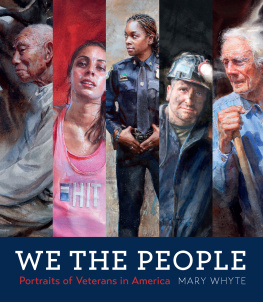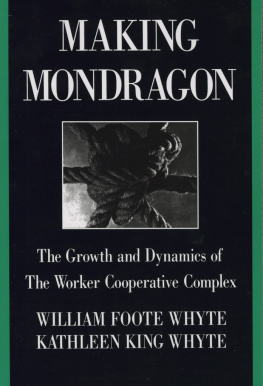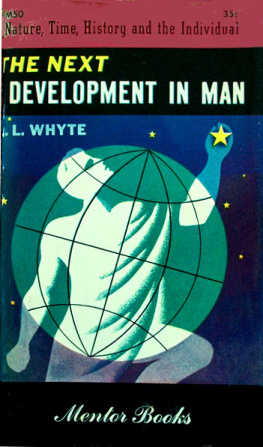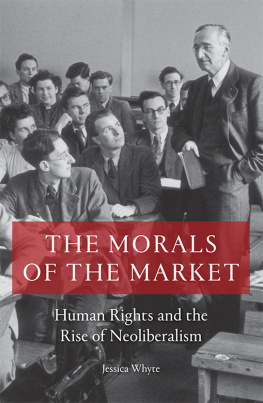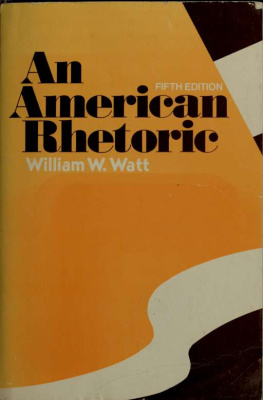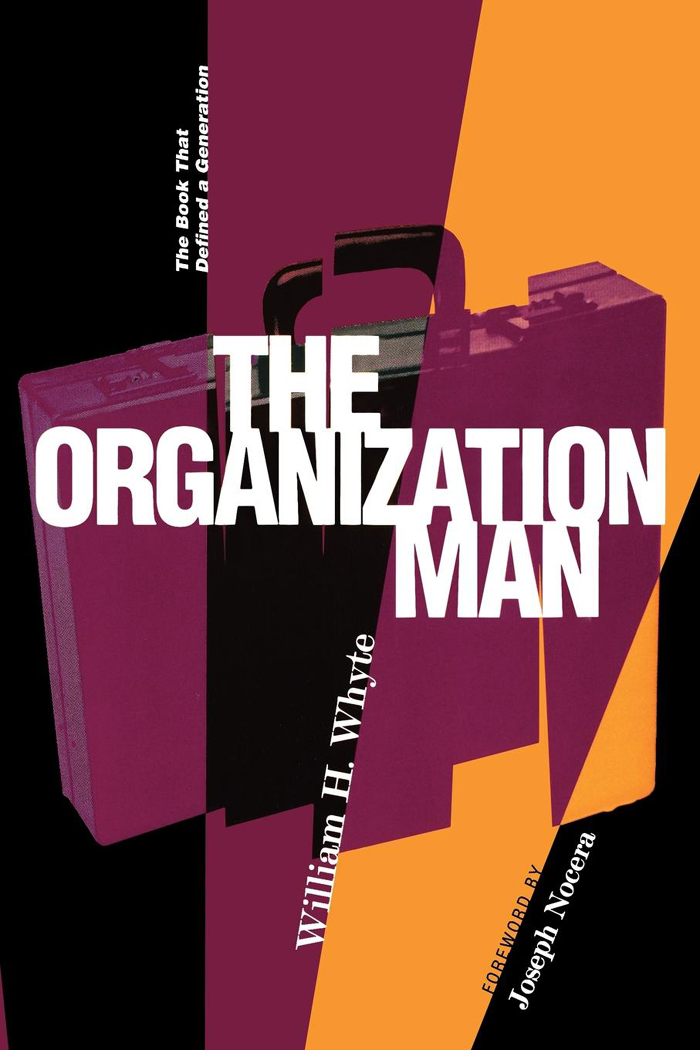The Organization Man
THE ORGANIZATION MAN
WILLIAM H. WHYTE
Foreword by Joseph Nocera

Originally published 1956 by Simon and Schuster, Inc.
Copyright William H. Whyte, Jr.
Foreword copyright 2002 University of Pennsylvania Press
All rights reserved
Printed in the United States of America on acid-free paper
10 9 8 7 6 5 4 3 2
Published 2002 by
University of Pennsylvania Press
Philadelphia, Pennsylvania 19104-4011
Library of Congress Cataloging-in-Publication Data
Whyte, William Hollingsworth.
The organization man / William H. Whyte, Jr. ; foreword by Joseph Nocera.
p. cm.
ISBN 0-8122-1819-1 (alk. paper)
Originally published: New York : Simon & Schuster, 1956.
Includes index.
1. Individuality. 2. Loyalty. I. Title. II. Nocera, Joseph
BF697 .W47 2002
301.15dc21
2002024390
Contents
Foreword
JOSEPH NOCERA
The Organization, Man
Sometime in the aftermath of the publication of William H. Whytes The Organization Man, the DuPont Corporation produced a print advertisement with the above headline. In the upper right-hand corner of the ad was a classic 1950s-era sketch of a handful of, well, organization men, dressed in look-alike suits and ties and fedoras, striding purposefully toward some unseen office. In the bottom left-hand corner sat a solitary figure, Bernie the Beatnik, in sandals and jeans, holding a guitar. In between the two images were about 200 words of copy, in fairly small print.
Given that The Organization Man came out in the fall of 1956 and stayed on the best-seller list through the following autumn, the ad was probably produced sometime in 1957. Eisenhower was in his second term, the cold war was ablaze, and what we now think of as 1950s valuesin many ways, the real subject of The Organization Mandominated the nations psyche. Yet when the ad first came to my attention not long ago, I blithely assumed that its purpose was to repudiate Whytes central thesis, which is that the American organizationand especially the large corporationwas systematically stamping out individuality, that people were foolishly allowing this to happen, and that this loss of individuality would eventually be ruinous to both the individual and the corporation. From my vantage point at the dawn of the twenty-first century, I assumed that DuPont would be using the ad to say that corporations were not as hellbent on conformity as Whyte had described themthat at DuPont, at least, a free-thinker like Bernie the Beatnik could blossom and thrive. After all, DuPont is a company that depends on science to create new products, and one of Whytes strongest beliefs was that scientific innovation would be greatly diminished if companies stopped hiring scientists who were free-spirits and even renegades. As he put it in a brilliant chapter, The Bureaucratization of the Scientist,
Management has tried to adjust the scientist to The Organization rather than The Organization to the scientist. It can do this with the mediocre and still have a harmonious group. It cannot do it with the brilliant; only freedom will make them harmonious. (213)
You read a paragraph like that some forty-five years after it was written, and you think, Of course. Who doesnt know that conformity stifles scientific endeavor? Surely DuPont understood that, even back in the 1950s.
But then I took a closer look at the ad and realized that my initial assumption about it had been completely wrong. As it happens, DuPont did indeed want to repudiate Whytebut not by saying that corporations were less conformist than he described. On the contrary, it wanted to defend that qualityto elevate it, to ennoble it, to make a virtue of it. In the ad, Bernie the Beatnik claims that hed never take a job with a big company: Go to work every day, do what youre told, lose your freedom, he grumbles. To which DuPont triumphantly replies: Its true that the organization men we know go to work every day. They dont think of this as losing their freedom but as pursuing a freedom that can be enjoyed only so long as have a strong, creative and productive nation. In other words, in sublimating your individuality, you werent just helping your company. You were helping your country. The Organization Ad, I guess you could call it.
What is it we believe today about the relationship between corporations and individuals? We believe, first of all, that large corporations such as General Motors and, yes, DuPont, remain hugely important institutionsthat much hasnt changed since Whyte wrote The Organization Man. They employ tens of millions of people, serve as critical engines of economic growth and prosperity, and influence the culture in incalculable ways. Although there was a fleeting moment in the late 1990s when corporations were being described as dinosaurs, no one really thinks that any more. Big corporations are as embedded into the fabric of the country today as they were in the 1950s.
What has changed, of course, is the way we deal with the corporations that employ usand the way corporations deal with us. Very few people join a company assuming theyll spend the rest of their career in that one place. Theyre no longer willing to move from city to city at the behest of the company, as they did when The Organization Man was published. (Nor, I might add, are the ranks of middle managers largely the preserve of men any more.) People dont assume that being loyal to one company will be rewarded in the end. They look for their own opportunities instead of waiting for the company to hand opportunities to them. Many people have fine and productive careers without ever spending a day in the employ of a large corporation. For its part, the company accepts these realities and sometimes even embraces them. Loyalty, after all, is hardly a corporate virtue any more.
But, as profound as these changes are, there is another that is every bit as important. Within companies, individuality is now a virtue instead of a vice. It has become conventional wisdom that corporate bureaucracies are deadly, that too many meetings are a waste of time, that contrary opinions have enormous value, that conflict can be healthy, and that most great ideasnot just in the research lab, but in the marketing department, among the sales force, and in the executive suiteare more likely to come from a single person with an original thought than from any number of well-meaning task forces. For employees, meanwhile, a chance to retain their individuality makes it far more likely that theyll actually like their jobs. A few years ago, a magazine called Fast Company was founded with the explicit mission of trumpeting the importance of individuality in corporate lifefor both the individual and the company. In a March 2001 cover story, the magazine claimed that all true, radical innovation begins as the work of a deviant. That pretty much sums it up. An ad like the one DuPont ran in reaction to The Organization Manits not even conceivable today. No corporation would argue that conformity is better than individuality. No corporation believes it anymore.
Of the handful of famous books published in the 1950s decrying the values of the eraThe Lonely Crowd, The Man in the Gray Flannel Suit, and The Power Elite among themnone have stayed with us the way The Organization Man has. Even though the book has been out of print for yearsan oversight that is being happily corrected with this new editionits title has long since entered the language. It instantly conjures someone we recognize: our former selves. Its who we used to beor, for baby boomers, who our parents used to bebut (we like to think) its not who we are any more.





